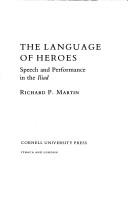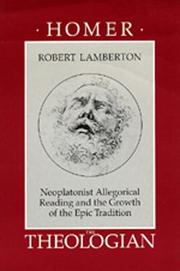| Listing 1 - 3 of 3 |
Sort by
|
Book
ISBN: 0691042381 1322019584 9781400860487 1400860482 9780691042381 0691606919 9780691606910 0691635609 Year: 1989 Publisher: Princeton, New Jersey
Abstract | Keywords | Export | Availability | Bookmark
 Loading...
Loading...Choose an application
- Reference Manager
- EndNote
- RefWorks (Direct export to RefWorks)
Using a reader-oriented approach, Shadi Bartsch reconsiders the role of detailed descriptive accounts in the ancient Greek novels of Heliodorus and Achilles Tatius and in so doing offers a new view of the genre itself. Bartsch demonstrates that these passages, often misunderstood as mere ornamental devices, form in fact an integral part of the narrative proper, working to activate the audience's awareness of the play of meaning in the story. As the crucial elements in the evolution of a relationship in which the author arouses and then undermines the expectations of his readership, these passages provide the key to a better understanding and interpretation of these two most sophisticated of the ancient Greek romances.In many works of the Second Sophistic, descriptions of visual conveyors of meaning--artworks and dreams--signaled the presence of a deeper meaning. This meaning was revealed in the texts themselves through an interpretation furnished by the author. The two novels at hand, however, manipulate this convention of hermeneutic description by playing upon their readers' expectations and luring them into the trap of incorrect exegesis. Employed for different ends in the context of each work, this process has similar implications in both for the relationship between reader and author as it arises out of the former's involvement with the text.Originally published in 1989.The Princeton Legacy Library uses the latest print-on-demand technology to again make available previously out-of-print books from the distinguished backlist of Princeton University Press. These editions preserve the original texts of these important books while presenting them in durable paperback and hardcover editions. The goal of the Princeton Legacy Library is to vastly increase access to the rich scholarly heritage found in the thousands of books published by Princeton University Press since its founding in 1905.
Description (Rhetoric) --- Greek fiction --- Reader-response criticism --- Rhetoric, Ancient. --- 875-31 --- 875 ACHILLES TATIUS --- 875 HELIODORUS EMESENUS --- Ancient rhetoric --- Classical languages --- Greek language --- Greek rhetoric --- Latin language --- Latin rhetoric --- Reader-oriented criticism --- Reception aesthetics --- Criticism --- Reading --- 875-31 Griekse literatuur: roman --- Griekse literatuur: roman --- 875 HELIODORUS EMESENUS Griekse literatuur--HELIODORUS EMESENUS --- Griekse literatuur--HELIODORUS EMESENUS --- 875 ACHILLES TATIUS Griekse literatuur--ACHILLES TATIUS --- Griekse literatuur--ACHILLES TATIUS --- History --- History and criticism --- Rhetoric --- Achilles Tatius. --- Heliodorus, --- Reader-response criticism. --- History and criticism. --- Romances [Greek ] --- Achilles Tatius --- Description (Literature) --- Rhetoric [Ancient ] --- Rhetoric, Ancient --- Achilles Tatius. -- Leucippe and Clitophon. --- Description (Rhetoric) -- History -- To 1500. --- Greek fiction -- History and criticism. --- Heliodorus, -- of Emesa. -- Aethiopica.

ISBN: 0801423538 Year: 1989 Publisher: Ithaca (N.Y.): Cornell university press
Abstract | Keywords | Export | Availability | Bookmark
 Loading...
Loading...Choose an application
- Reference Manager
- EndNote
- RefWorks (Direct export to RefWorks)
Achilles (Greek mythology) in literature --- Epic poetry, Greek --- Heroes in literature --- Performance in literature --- Speech in literature --- Trojan War --- History and criticism --- Literature and the war --- Homer. --- Homerus --- Language.

ISBN: 0520054377 9780520054370 0520066073 0520066227 0520909208 0585164266 1282355481 9786612355486 9780520909205 6612355484 9780520066076 9781282355484 9780585164267 Year: 1989 Volume: 9 Publisher: Berkeley University of California Press
Abstract | Keywords | Export | Availability | Bookmark
 Loading...
Loading...Choose an application
- Reference Manager
- EndNote
- RefWorks (Direct export to RefWorks)
Here is the first survey of the surviving evidence for the growth, development, and influence of the Neoplatonist allegorical reading of the Iliad and Odyssey. Professor Lamberton argues that this tradition of reading was to create new demands on subsequent epic and thereby alter permanently the nature of European epic. The Neoplatonist reading was to be decisive in the birth of allegorical epic in late antiquity and forms the background for the next major extension of the epic tradition found in Dante.
Epic poetry, Greek --- Religion in literature --- Neoplatonism --- Allegory --- History and criticism --- Homer --- Religion --- Neoplatonism. --- Religion in literature. --- History and criticism. --- 875 HOMERUS --- -Neoplatonism --- Religion in drama --- Religion in poetry --- Greek epic poetry --- 875 HOMERUS Griekse literatuur--HOMERUS --- Griekse literatuur--HOMERUS --- -Homer --- Homeros --- Homère --- Alexandrian school --- Church history --- Hellenism --- Philosophy --- Philosophy, Ancient --- Platonists --- Theosophy --- Personification in literature --- Symbolism in literature --- Religion. --- Homerus --- Neoplatonisme --- Homère. Influence. --- Homerus. Invloed. --- Hóiméar --- Hūmīrūs --- Gomer --- Omir --- Omer --- Omero --- Ho-ma --- Homa --- Homérosz --- האמער --- הומירוס --- הומר --- הומרוס --- هومر --- هوميروس --- 荷马 --- Ὅμηρος --- Гамэр --- Hamėr --- Омир --- Homero --- 호메로스 --- Homerosŭ --- Homērs --- Homeras --- Хомер --- ホメーロス --- ホメロス --- Гомер --- Homeri --- Hema --- Pseudo-Homer --- Pseudo Omero --- Epic poetry, Greek - History and criticism --- Homer - Religion --- Shakespeare, William --- Allegory. --- Epic poetry --- Ethics. --- Symbolism. --- achilles. --- allegory. --- ancient philosophy. --- bards. --- calchas. --- classicism. --- classics. --- dante. --- divine inspiration. --- divinity. --- epic poetry. --- epic tradition. --- epic. --- form. --- genre. --- gods and goddesses. --- greco roman studies. --- greek. --- hero. --- homer. --- homeric poems. --- iliad. --- invocation. --- literary criticism. --- literary theory. --- literature. --- myth. --- mythology. --- nonfiction. --- odyssey. --- oral tradition. --- platonic tradition. --- platonism. --- poetic form. --- prophecy. --- religion. --- religious experience. --- revelation. --- semiotics theory. --- supernatural. --- theoclymenus. --- tiresias. --- trojan war.
| Listing 1 - 3 of 3 |
Sort by
|

 Search
Search Feedback
Feedback About UniCat
About UniCat  Help
Help News
News